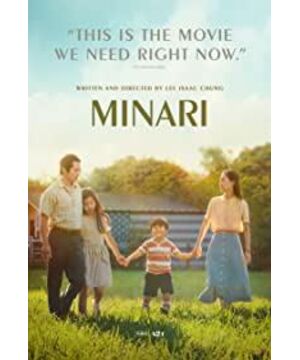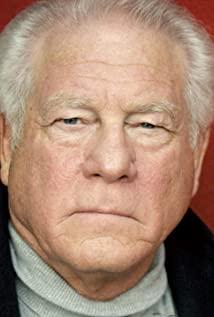"We came to America to save each other."
Author: Enlightening
First release: Gyro movie
"This is the movie we need now" , the comment given by the film critic of the "Los Angeles Times" was written on the poster of "Minari". This film, directed by Lee Isaac Chung (Lee Isaac Chung) and co-produced by A24 and Plan B, has become a major player in North American media and film critics since it won the 2020 Sundance Film Festival Jury Award. The pearl in the palm. Recently, with the arrival of the awards season delayed due to the new crown epidemic, many Oscar outposts that have been nominated or awarded have recognized "Minari". The most important independent film award in the United States-the American Spirit of Independence Award The nomination list was announced on January 27, 2021. "Minari" received 6 nominations, second only to "Never, Rarely, Sometimes, Always", which is the leader with 7 nominations. According to the current situation, "Minari" will most likely be shortlisted for the Oscars for Best Picture, Best Director, Best Original Screenplay, Best Supporting Actress, Best Original Soundtrack and other awards.
Since "Crazy Rich Asians" (Crazy Rich Asians), which was nominated for Best Music/Comedy at the Golden Globe Awards in 2018, we have been pleasantly surprised to see that Asian-dominated films have gained more presentation and recognition in Hollywood. Although "Don't Tell Her" (The Farewell) has not been nominated for an Oscar, its high media and public reputation and sweep of independent film awards have made it a milestone in Hollywood Asian movies. This needs to be attributed to the efforts of a new generation of Asian directors-they are Hollywood "millennials" who entered the film academy around 2000, and in recent years have begun to be favored by filmmakers and the film market , whether they are Zhu Haowei, Wang Ziyi or Zheng Yishuo, their parents are immigrants who came to the United States from East Asia, as 1.5-generation immigrants (born in their home country, came to the United States with their parents and went to school in the United States as a child) or second-generation immigrants (born in the United States, parents They immigrated to the United States before the child was born), they have such a special growth experience: parents and elders still speak their mother tongue at home, but they receive English education at school. The dislocation of language is accompanied by cultural differences. The conservative East Asian family culture and modern American values that emphasize freedom and independence often conflict. They grew up in this rift between language and culture.
Director Zheng Yishuo grew up on a small farm in rural Arkansas. He was admitted to Yale University and majored in ecology. He dropped out of medical school in his senior year and transferred to the University of Utah to major in film production. He obtained the degree in 2004. MFA degree. "Minari" is such a movie, adapted from the director's childhood experience. Zheng Yishuo uses affectionate brushstrokes and shots to tell the struggle, bitterness and joy of his parents as first-generation immigrants.
It is also a very successful small-cost independent film. If Zhao Ting’s "A Place to Nowhere" conveys the post-modern philosophy of nomads in a lonely tone, then it is soft light, warm tones, and set in "Minari" in the Reagan era has a more active and vigorous tone . East Asian immigrants came from a poor mother country to a lighthouse country on the other side of the ocean. They were attracted and coerced by the narrative of the American dream, yearning for a new life and fighting for it. try best.
However, the sorrow belonging to East Asia has not dissipated due to the migration of geographical space. "Minari" tells the story of a heartbroken and warm family. In the 1980s, a couple Jacob (Steven Won) and Monica (Han Yeli) who immigrated to the United States from South Korea moved to California on the west coast. In Arkansas in the central United States, Jacob is determined to run a farm on the land he bought. He and his neighbor Paul (played by Will Patton) grow crops together; Monica is not used to life in Arkansas, so her mother Soonja Moving to live with them in their RV from South Korea, Soonja took his grandson David, who suffered from congenital heart disease, to a stream not far from home and planted cress; and seeing the crops harvested and about to be sold, Soonja was elderly. Unfortunately for a stroke, the couple’s marriage was also on the verge of rupture due to the accumulation of various contradictions. However, after an accidental fire burned the farmhouse to ashes, the surviving couple began to rebuild their lives when Jacob brought his son David. When they got to the stream, they found that the water celery was already lush.
The story of "Minari" is not ups and downs. Most of the film's time is to show the details of the family getting along, such as cooking, communicating, washing at home, planting on the farm, irrigating and so on. The narrative of the life flow of "Minari" builds up the "reality" that the film wants to express and its connection with modernity: Compared with the modern society/urban life full of time and technology, the time in the pre-modern rural areas is centered on The public time constituted by anniversaries or festivals , except that Monica takes the whole family to church and always sees Paul walking with a cross on the return trip. The time of the movie is always vague and lacks marks, which reflects both The normal memory and forgetting mechanism, that is, the director’s fragmentation of childhood experiences; at the same time, through this "no event" narrative mode to highlight the tension between tradition and modernity-in sharp contrast with the modern United States, in Arkansas In this isolated farm in the state, it is common to cut off water and electricity, and even domestic garbage can only be disposed of by incineration. When Zheng Yishuo tried to understand the sad emotions of his parents as a generation of immigrants and conveyed it to the audience by means of images, he had no intention of using it. To complete discrete events with a clear time mileage, the joy and sorrow that permeates the film is also slowly brewing in these life-stream passages that have no special significance.
The success of "Minari" lies not only in Zheng Yishuo's simple and sincere dramas, but the construction of its audio-visual system is also the benchmark of American independent films in recent years. The main point of view of "Minari" is determined in the first paragraph of the film: the picture gradually brightens, the lens is first aimed at the young David, and the next set of shots are all shots that simulate David's subjective point of view; After David fell asleep, the screen time was compressed, and in a blink of an eye the whole family had arrived at the land they bought and the mobile home they lived in.
Contrast with the iconic long shot of "A Place of Nowhere"—the mid-range shot follows Fern through the car camp from the side and rear, and realizes the deep control of the endless desert in front of her— "Minari" There are multiple passages through the "convergence" of the characters on the screen and the camera, that is, when the characters move towards the camera, the camera slowly approaches the characters. This kind of lens movement creates a positive sense of affinity, and the audience seems to be invited to the characters Having close dialogues, this kind of intimacy between the audience and the characters on the screen achieved through scene scheduling gives "Minari" a more abundant room for empathy.
It is worth noting that the soundtrack of "Minari" was composed by the new generation of soundtracker Emile Mosseri (Emile Mosseri), although the 35-year-old Mosseri has not yet been nominated for Oscars and Emmys. , But his works in recent years have proved that he will be one of Hollywood's most important soundtracks in the coming decades.
It has only been three years since he started producing original soundtracks for films and TV dramas, but with his outstanding performances in "The Last Black Man in San Francisco", "The Way Home", "Billionaire" and "Minari", he has injected new ideas into American independent film soundtracks. The soul of Moselli, the style of the soundtrack created by Moselli is changeable. He is good at creating a soundtrack based on strings, alternately using piano strong and weak pedals and vocal solo/chorus as the main melody. Moselli often emphasizes popular songs. Write accompaniment, such as "San Francisco" in "The Last Black Man in San Francisco" and "Mr. Lonely" in "Billionaire". The accompaniment recreated by Moselli often appears in the film in the form of a soundtrack. , The ending is a complete cover song, which constitutes the echo and loop of the film’s music.
Moseley freed the soundtrack from the function of emphasizing emotions and exaggerating atmosphere-no longer "film music", but "musical film" . In "Minari", the Korean version of "Rain Song" composed by Moselli and sung by the heroine Han Yeli is the ending song, and its accompaniment appears at the beginning of the film; what is even more impressive is that " In the morning after "burning", a family of four cuddled with each other and slept on the floor. The tearful grandmother stared at them dreamily. The next two shots are the newborn sun and the vibrant grass. The soundtrack follows the editing point. Variations, day/night, interior and exterior scenes, the abrupt sense of jumps between scenes is completely eliminated by the healing power of chords, the film transitions to the final scene in this sad and hopeful mood : Jacob decides to dig the well again-this time with Together with the wife; Jacob took his son David through the forest to the stream, and the season of harvest was ushered in the silent growth of water celery.
Thus, like the family letter written by Wang Ziyi to his grandmother, Minari once again proves to us that the most personal experience contains the most universal power, unpretentious, and touching. Those immigrants who came to the United States from all over the world tried their best and almost stubbornly to fight for their American dream. They understood Minari’s philosophy of survival-cress, even if they were randomly sown in a foreign country. By the river, they are still struggling to grow, endlessly. The song without a melody will also be sung in immigrant families from generation to generation:
"Wonderful, Minari. Minari, wonderful."
View more about Minari reviews











